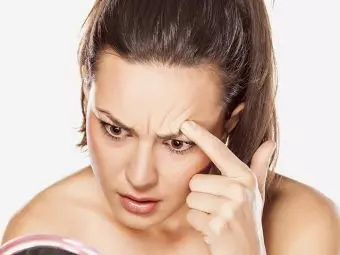Dutasteride for hair loss is popular as an effective treatment option (1). Hair loss is a common problem faced by both women and men. To some extent, it can impact psychological well-being and may also affect self-esteem. Many people claim that dutasteride is effective for hair loss. Read on to know if the claims are real or not, how dutasteride may work, and possible side effects which result from its consumption.
In This Article
What Is Dutasteride?
Dutasteride is a common medication used to treat benign prostatic hyperplasia (2). It helps prevent the enlargement of the prostate gland. Dutasteride is also used for treating hair loss. It works by preventing the conversion of testosterone to DHT (or dihydrotestosterone). It is not available over the counter and can be obtained only with a doctor’s prescription. You get it in the form of a liquid-filled capsule.
Though dutasteride may help prevent hair loss, it has some risks. We have listed them in the next section. Most of these risks are based on anecdotal evidence.
Risks Associated With Dutasteride
- Allergies: Dutasteride may cause allergies in some individuals. Practice caution if you have a history of allergies. Discuss with your doctor.
- Pediatric: Dutasteride is not meant for children. It has not been tested on this age group for efficacy.
- Elderly: There is not enough evidence to suggest that dutasteride could be safe for the elderly. Consult a doctor.
- Pregnant Or Breastfeeding: Evidence suggesting the safety of dutasteride in pregnant or breastfeeding women is lacking. Stay safe and avoid use.
- Drug Reactions: Dutasteride may interact with certain drugs. Discuss your existing medications with your doctor. They may reduce or change the dose accordingly. Certain medications Dutasteride may interfere with include Cimetidine, Ciprofloxacin, Diltiazem, Ketoconazole, Ritonavir, and Verapamil (2).
- Other Interactions: Dutasteride may also interfere with certain meals or types of food. Using it with alcohol or tobacco may cause adverse effects. Consult your doctor for more information.
- Specific Medical Problems: Those with ailments like liver disease must be wary while using dutasteride. More research is warranted in this regard. Talk to your doctor before taking the medication.
Some individuals also claim to have experienced breathing difficulty, chest discomfort, dilated neck veins, weight gain, excessive fatigue, difficulty in swallowing, flaking or blistering of the skin, itchiness, and rapid heartbeat. Rarely, dutasteride is also believed to cause sexual dysfunction.
How Should You Use Dutasteride?
Dutasteride should be used as directed by a healthcare professional. You should follow the frequency, dosage, and duration as directed.
- You may take it with or without food.
- You must swallow the capsule and not crush or chew it.
- Check the patient information leaflet before taking the medication. Read all the instructions and get all your doubts clarified by your doctor.
In the next section, we will find out how dutasteride helps with hair regrowth.
How Does Dutasteride Help Regrow Hair?
Each hair strand goes through four stages of the growth cycle, namely anagen (or growth phase), catagen (or regression phase), telogen (or the resting phase), and exogen (or the shedding phase).
Androgenetic alopecia or AGA occurs during the anagen phase. The anagen phase becomes shorter, leading to hair follicle miniaturization. AGA is caused due to the conversion of testosterone to DHT, a process triggered by the 5-alpha-reductase enzyme. Dutasteride inhibits this enzyme and may help prevent hair loss (3). In a study, varied hair regrowth was observed in patients treated with dutasteride. However, dutasteride does not offer a guarantee for hair regrowth. Its results vary between individuals (4).
Dutasteride is often compared with finasteride, which is another medication popular for treating hair loss. But which of the two is more effective?
Finasteride Vs. Dutasteride For Hair Loss
In a study, both finasteride and dutasteride were used on patients with androgenetic alopecia (5). It was found that 30% to 50% of patients with androgenetic alopecia did not show any significant improvement with finasteride. However, 78% of the patients showed improvement with dutasteride, while the remaining showed no significant change. The improved lot also observed an increase in their hair thickness and density by 10% (5).
The study concludes by stating that dutasteride can be used as an alternative treatment for patients who have not responded to treatment with finasteride.
In yet another study, dutasteride was more effective than finasteride for controlling hair loss (1). However, both showed similar rates of adverse reactions in sexual dysfunction.
How Long Does Dutasteride Take To Work For Hair Loss?
Dutasteride may take three months to six months or even longer to show results. This duration depends on the severity of hair loss and the patient’s pre-existing health condition. Keep your healthcare professional updated about how you are feeling during treatment.
Dutasteride for hair loss treatment does not offer guaranteed regrowth, and its results may vary from person to person. However, it has been shown to be more effective than finasteride, another medication used to prevent hair loss. On the other hand, dutasteride is associated with several adverse effects, like allergic reactions and drug interactions. Also, children, the elderly, and pregnant women must not use this drug due to the lack of evidence guaranteeing its safety. Above all, it is a prescription drug, so strictly follow the dosage, duration, and frequency as recommended by a medical professional.
Frequently Asked Questions
What should you discuss with your doctor before starting dutasteride?
These are the points you must discuss with your doctor before starting dutasteride for hair loss:
Complete details about your past medical and surgical history.
All current prescription and non-prescription medications.
Any allergies.
What precautions should you follow while/after taking dutasteride?
Take the following precautions while/after taking dutasteride:
Avoid blood donation for at least six months after stopping dutasteride. This medicine stays in your bloodstream
for around 4 to 6 months after discontinuation.
Never have sexual intercourse without using protection. Dutasteride was found in the semen of patients who were
on it.
Key Takeaways
- Dutasteride prevents the conversion of testosterone to dihydrotestosterone, reducing hair loss.
- Though it can treat hair loss, it also may pose some potential risks like allergies and drug reactions.
- Dutasteride may take three to six months or even longer to work on hair loss.
References:
Articles on StyleCraze are backed by verified information from peer-reviewed and academic research papers, reputed organizations, research institutions, and medical associations to ensure accuracy and relevance. Read our editorial policy to learn more.
- The efficacy and safety of dutasteride compared with finasteride in treating men with androgenetic alopecia: a systematic review and meta-analysis
https://www.ncbi.nlm.nih.gov/pmc/articles/PMC6388756/ - Dutasteride: A Review of Current Data on a Novel Dual Inhibitor of 5α Reductase
https://www.ncbi.nlm.nih.gov/pmc/articles/PMC1550785/ - Dutasteride in Androgenetic Alopecia: An Update
https://pubmed.ncbi.nlm.nih.gov/28294070/ - Genetic variations associated with response to dutasteride in the treatment of male subjects with androgenetic alopecia https://journals.plos.org/plosone/article?id=10.1371/journal.pone.0222533
- Effect of dutasteride 0.5 mg/d in men with androgenetic alopecia recalcitrant to finasteride https://pubmed.ncbi.nlm.nih.gov/24898559/
Related
The following two tabs change content below.
- Author
- Reviewer
Annie Jangam
Annie Jangam is a researcher-turned-content writer. She enjoys dissecting complex clinical studies and shuffling through the scientific jargon to make… more
Dr. Somodyuti Chandra
(MBBS, MD DVL & DNB )Dr. Somodyuti is a board-certified dermatologist who specializes in skin, hair, and nail problems, laser surgery, and esthetic procedures. After… more



 How To Use Jamaican Black Castor Oil For Hair Growth
How To Use Jamaican Black Castor Oil For Hair Growth How To Exfoliate Your Scalp At Home To Clear Excess Oil
How To Exfoliate Your Scalp At Home To Clear Excess Oil How To Apply Oil On Hair: A Step-By-Step Guide
How To Apply Oil On Hair: A Step-By-Step Guide How To Use Coconut Oil For Dry Scalp And Dandruff
How To Use Coconut Oil For Dry Scalp And Dandruff Easy Way To Get The Perfect Twist Out On 4C Natural Hair
Easy Way To Get The Perfect Twist Out On 4C Natural Hair Eyebrow Hair Loss: Causes, Prevention Tips, & DIY Methods
Eyebrow Hair Loss: Causes, Prevention Tips, & DIY Methods Types Of Hair Loss, Causes, Treatments, & Prevention Options
Types Of Hair Loss, Causes, Treatments, & Prevention Options Itchy Scalp And Hair Loss: How To Treat And How To Prevent It
Itchy Scalp And Hair Loss: How To Treat And How To Prevent It What Is Hair Texturizing? How To Take Care Of Texturized Hair?
What Is Hair Texturizing? How To Take Care Of Texturized Hair?